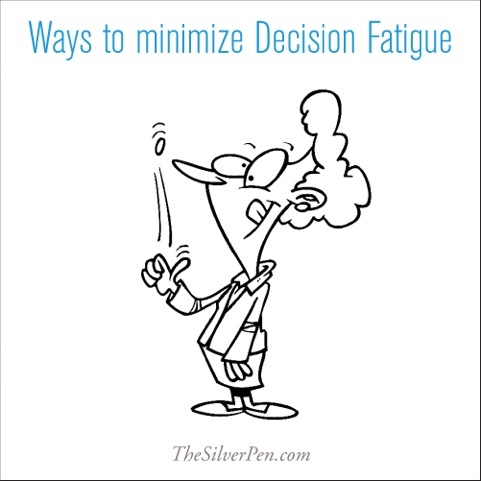 Ways to Minimize Decision Faitgue
Ways to Minimize Decision Faitgue
One of the many challenges of navigating the world of health care after a cancer diagnosis is that there are a trillion decisions to make (or at least it feels like there is!). I remember feeling so incredibly overwhelmed that it felt like my brain would just shut off and refuse to make a decision. The littlest things like what shoes to wear or which type of tea I wanted to make had the potential to send me into a melt down. And for the record, my meltdowns tend to be epically bad, filled with a whole lotta f-bombs!
Although I am already years out of my cancer treatment, I still suffer from decision fatigue. It is a very, VERY real thing and is not limited to people with serious illness. In fact, when you think about it, most people routinely make gobs of decisions every day. Each and every decision takes a dollop of brain power. Add in a stressful doctor’s appointment, for example, and the ability to think clearly and weigh options wisely goes down the tubes.
Here a few tips I have found helpful when trying to minimize decision fatigue. I used these methods during treatment and still incorporate many of them in my daily routines today.
1. Eat the same thing. I know many elite performers that eat the exact same thing everyday. Literally, the exact same thing: fish, green beans, and almonds five times a day. They may throw a little chicken into their meal at dinner time but that’s it for variety! When your body can expect the same meal all day long, it easily frees up mental space in your mind. This was something that was key for me during treatment. I would eat frequent small meals (even when I wasn’t hungry) throughout the day.
2. …Or almost eat the same thing. Truthfully, eating the exact same thing everyday is just not possible for me. Sooooo, a much less drastic way to implement this principle is to have a weekly formula for your meals. On Mondays you can expect to eat Mexican. On Tuesday’s you can expect to eat Italian and so on. Having a structured eating schedule will allow your mind to not be consumed with thoughts about food and further enable you to make better more acute decisions.
3. Embrace daily routines. Every morning I get up and make matcha green tea (my absolute favorite!) and then I either read or go for a run. I also have a nightly routine which consists of turning off all electronics an hour before I go to bed. I spend the hour either reading or having family time. Simple daily routines like this alleviate my mind and enable mental space to make other more important decisions.
4. Establish hard edges in your day. Set a start time and an end time for work (even if you work alone, like I do). Dedicate different time slots through out your work day to different activities such as administrative work, correspondence, creative work, meetings, etc. These hard edges will keep tasks from taking longer than they should and not allow them to encroach on your other work tasks.
5. Create “if-then” rules for yourself. If “X” happens, then I will do “Y”. It’s high school algebra all over again (thank the good Lord that it’s not Geometry!). This method allows you to decide your course of action in advance, before you’re tired, stressed, or swamped. For me it looks like this: “If I drink a cup of wine, then I pour a glass of water.”
6. If it incites decision angst, drop it. If there is a decision that must be made continuously and always causes you angst then get rid of it. For example, I canceled my gym membership at a local gym in Santa Barbara because I didn’t like going and the decision to go or not to go always caused me angst. Therefore, I canceled my membership and have decided to stick to outdoor runs and at-home work outs. I am much happier about having one less decision to make every day.
7. Limit your options. The truth of the matter is that we humans are happier and more productive when we have fewer options to choose from. It’s as simple as that. Instead of asking your family “What do you want for dinner tonight?” ask them ” Would you rather have pasta or sushi?” Limiting your options makes it much easier to make a decision and be satisfied with your decision.
Hope that some of these tips help you! How do you minimize decision making in your daily life?

